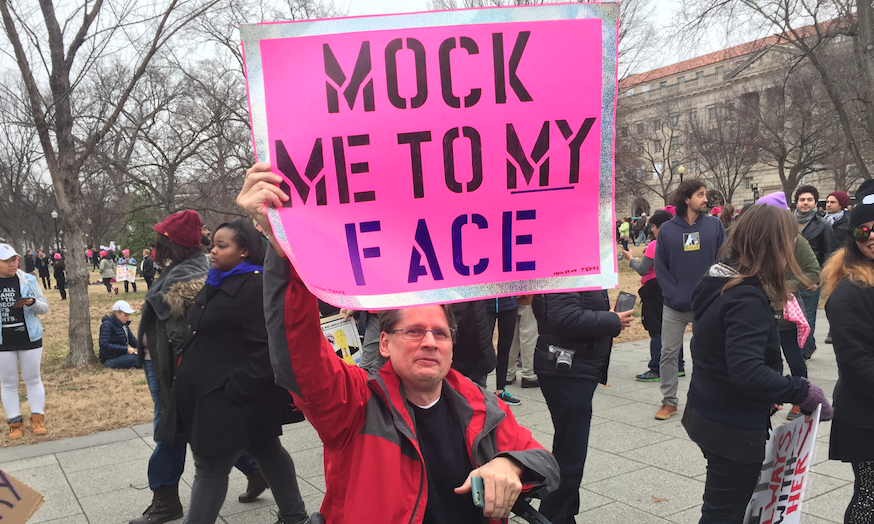
“Disabling” Trump
By Rich Arenschieldt
“I do not expect this child to survive” reads my pediatrician’s medical note, handwritten on Hospital of the University of Pennsylvania stationery dated July 10, 1960. Born at the finest children’s hospital in the world, under the care of pediatrician and former surgeon general C. Everett Koop and orthopedist Erwin “Rudy” Schmidt, to everyone’s amazement, I lived.
Surgeries, braces, casts, six-inch needles that served as the vehicle for experimental nerve blocks (the youngest patient in an early clinical trial—thanks to a high pain threshold), nothing thwarted me. A child with cerebral palsy raised by a southern Steel Magnolia mother and a Teutonic father would not be coddled. In an era before “reasonable accommodation” in my household, there was no reason to “accommodate.”
None of that prepared me for what occurred on Saturday, January 20, 2017, during the Women’s March on Washington—the most profound day of my life.
My cousin Emily, a North Carolinian (and the youngest in a line of indomitable women), suggested we attend. Since I, like many, needed something to help jettison a pervasive post-election paralysis, I agreed. Plane tickets were purchased, a friend’s empty DC condo borrowed, but one thing remained: What words to bring? What message to share?
Meryl Streep’s selflessly poignant Golden Globe speech boomeranged the campaign’s most reprehensible moment back to me. But how to distill her castigation down to a mere protest placard? The five-word solution: “Mock Me to My Face.” Bold letters and, in deference to my fellow marchers, pink poster board, purposefully discernible from afar. On a day of multitudinous messages, this one was mine. Fifty-six years of stumbling expertise supported its simple utterance. For the very first time, I let my physical limitations define me.
My friends say, “People tend to notice Rich” (the understatement of the century). Marching with my characteristic “crisscross” gait, a four-wheeled walker, a huge sign held aloft, and a gorgeous companion created a movable stage for my specific sentiment.
I never realized how five words would resonate with so many.
Passersby looked (as always) at me, then (as always) at Emily, and then, at the sign—taking a split second to hear the words in my voice, and then, in their own. What their intellect discerned, their hearts seized upon and their voices articulated. I was ill-prepared for the torrent of response.
Hundreds of women and men stopped their protest processional to join mine. Be it a simple “thumbs up” or a tearful tale from a woman who had adopted two daughters with cerebral palsy, never have I experienced such a deluge of compassion.
Mothers told me this: “When that reporter was mocked, my child felt as if it was happening directly to them.” These family members were still, months later, completely bewildered at how to explain such an exploit, especially to their younger children, who had experienced it so viscerally.
The intensity of the crowd’s response was now obvious to me and Emily…something was happening. As we turned onto Constitution Avenue, hundreds more people approached saying, “Thank you for being here. My disabled daughter/son/friend/mom/dad could not make this trip. You are here for them.”
“Me? Here for them?”
At this point, I realized how few differently-abled marchers were in attendance. Though the organizers had gone to great lengths to ensure accessibility for all, it became suddenly apparent to me what a difficult endeavor, for some, this would be. A long trek in mid-winter Washington amidst huge crowds who would unintentionally bump or jostle an already unsteady individual? This scenario would panic a sure-footed mountain goat, much less a person with mobility issues.
“Yes. I was here. For them.”
Five hours and a few miles later, we reached the Ellipse, just south of the White House. Across the grass, I looked at our nation’s “home,” no longer inhabited by the family I had grown to know and love. That realization, coupled with a seemingly lifelong burden of my “five words,” was too much. My pink placard and my resolve crumbled.
As always, there is someone nearby to “pick the pieces of me” up. As Emily caught me, I caught my breath and we moved forward.
When I was a youngster, “anti-bullying” protocols did not exist. I managed the cruelty of my classmates and others by creating a détente of humor infused with the fierceness of a lion.
Interestingly, it took the Women’s March on Washington to make me roar again.
Hear me.











Comments